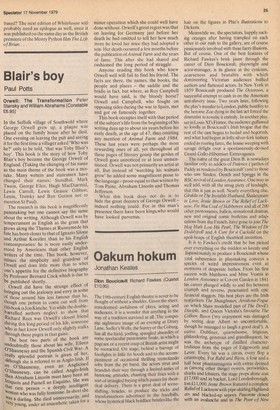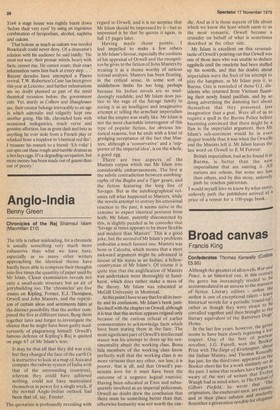Oakum hokum
Jonathan Keates
Dion Boucicault Richard Fawkes (Quartet 210.95) The 19th-century English theatre is never to be thought of without a shudder. Given the sheer, unredeemed awfulness of plays, acting and audiences, it is a wonder that anything in the way of a tradition survived at all, The composite nightmare image of an evening at Drury Lane, Sadler's Wells, the Surrey or the Coburg, has all the lurid, jostling, spangled absurdity of some spectacular pantomime finale, in which a pageant or a recent coup of British arms might be reenacted. On stage, behind a barrage of footlights in little tin hoods and to the accompaniment of occasional thrilling tremolando sobs from the pit band, the actors strut and brandish their way through a limited series of histrionic attitudes, chanting their lines with a sort of strangled baying which passes for theatrical delivery. There is a great deal of sceneshifting, besides, to produce the tricks and transformations advertised in the handbills, whose hysterical black boldface bristles like the hair on the figures in Phiz's illustrations to Dickens.
Meanwhile we, the spectators, happily sucking oranges after having trampled on each other in our rush to the gallery, are of course passionately involved with these faery illusions. But of course. One of the best features of Richard Fawkes's brisk jaunt through the career of Dion Boucicault, playwright and actor-manager, is its glance at the cynicism, coarseness and brutality with which domineering Victorian audiences bullied authors and flattened actors. In New York in 1859 Boucicault produced The Octoroon, a successful attempt to cash in on the American anti-slavery issue. Two years later, following the play's transfer to London, public hostility to the heroine Zoe dying in the last act forced the dramatist to rewrite it entirely. In another play, set in Louis XI's France, the audience guffawed so loudly at Boucicault's Irish brogue that the rest of the cast began to bedad and begorrah, and what had begun as lofty silver-fork tushery ended as roaring farce, the house weeping with savage delight over a spontaneously-devised Grand Gallo-Hibernian Extravaganza.
The name of the great Dion B. is nowadays familiar only to addicts of Patience ('pathos of Paddy as rendered by Boucicault') and to those who saw Sinden, Dench and Spriggs in the RSC revival of London Assurance. One may as well add, with all the smug piety of hindsight, that this is just as well. Nearly everything else, GiraIda or The Invisible Husband, Shakespeare in Love, Jessie Brown or The Relief of Lucknow, Fin MacCoul of Skibbereen and all of 200 other pantomimes, ballets, sensational dramas, new and original comic burlettas and adaptations from the French, have gone to join The Hog Hath Lost His Pearl, The Wisdom of Dr Doddypoll and A Cure for a Cuckold on the spoil-heaps of English theatrical invention. It is to Fawkes's credit that he has picked over everything on the midden so keenly and iispassionately,to produce a Boucicault whose total, submersion in playmaking conveys a species of weird impressiveness even at moments of desperate bathos. From his first success with Matthews and Mme Vestris in London Assurance at Covent Garden in 1841 his career plunged wildly to and fro between triumph and reverse, punctuated with epic financial staggers. His best plays are the Irish tearjerkers The Shaughraun, Arrah-na-Pogue on which Shaw modelled part of The Devil's Disciple, and Queen Victoria's favourite The Colleen Bawn ('my enjoyment was damaged by seeing dear Albert so uncomfortable, though he managed to laugh a good deal). A native Dubliner, quarrelsome, litigious, philandering, generous and grandiloquent, he was the archetype of distilled character Irisliness from the pages of Edgeworth and Lever. Every hit was a circus, every flop a catastrophe. For Babil and Bijou, a four and a half hour phantasmagoria with extras dressed as (among other things) oysters, periwinkles, sharks and lobsters, the stage props alone cost
£17,000 and its backer, Lord Londesborough, lost L11,000.Jessie Brown featured a complete Relief of Lucknow with pipe-skirling Highlanders and blacked-up sepoys. Pauvrette closed with an avalanche and in The Poor of New York a stage house was nightly burnt down 'before their very eyes' by using an ingenious combination of lycopodium, alcohol, naphtha and oakum.
That hokum as much as oakum was needed Boucicault could never deny. Of a dramatist's relation with his audience he said baldly: 'He must not soar; their prosaic minds, heavy with facts, cannot rise. He cannot roam; their exact information turns him back at every step ...' Recent decades have attempted a Pinero revival, T.W. Robertson's Caste has been given this year at Leicester, and further exhumations are no doubt planned as part of the timid theatrical recession before the government cuts. Yet, sturdy as Colleen and Shaughraun are, their creator belongs irrevocably to an age in which adrenalin and vulgarity kept one another going. His life, chronicled here with occasional inelegancies, much verve and genuine affection, has as great dash and brio as anything he ever stole from a French play or whisked from a trapdoor in 'chemical red fire'. I treasure his remark to a friend: 'Eh voila! I can spin out these rough-and-tumble dramas as a hen lays eggs. It's a degrading occupation, but more money has been made out of guano than out of poetry.'







































 Previous page
Previous page